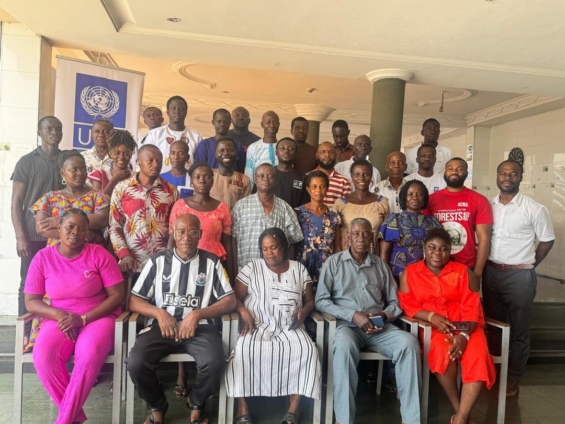
Audio By Carbonatix
A multi-stakeholder approach is being proposed in proffering solutions to challenges hindering cocoa production and its trade.
National Project Manager of Green Commodity Programme at UNDP, Mathias Edetor, believes empowering the local community is the first step towards dealing with environmental challenges hindering cocoa production among others.
He said it is the project’s firm belief that “when the grassroots is firm, we can work together to fight issues of unhealthy environmental practices and promote climate-smart cocoa production”.
He spoke to JoyNews on the sidelines of a training event for executives within the Hotspot Intervention Areas (HIAs) under the Ghana Cocoa Forest REDD+ Programme aimed at building capacities to drive collaborative multi-stakeholder action.
Ghana produced 531,000 metric tons in the 2023/2024 cocoa season, an amount experts claim to be below the country’s capacity.
To Mr. Edetor, the decline could be attributed to multiple factors which include climate change and other environmental challenges in the landscape.
It was for these reasons the Green Commodities Programme with funding from the Swiss State Secretariat for Economic Affairs (SECO) teamed up with multiple stakeholders to identify solutions to improve cocoa production and trade as well as transformation of agricultural systems.
Mr. Mathias Edetor said equipping executives with adequate knowledge to deal with stakeholder analysis in the landscape would promote sustainable cocoa production.
Participants in the training programme also sharpened skills in reporting and data management skills, ability to leverage Information Communication Technologies (ICT) for the multi-stakeholder collaboration.
They were also trained to identify and leverage opportunities for sustainable investments that support both environmental conservation and economic development.
Also the training impressed the need for the HIA executives to effectively engage and manage farmer cooperatives, private sector actors, and government institutions.
Mr. Sylvester Mensah, a training beneficiary, enumerated some beneficiary communities that have derived from the Ghana Cocoa Forest REDD+ Programme (GCFRP) through education provided by the HIA executives’ education.
“Some communities have commenced afforestation, climate-smart agriculture and land restoration processes to enhance productivity and nature conservation,” he said.
Others include farming inputs and community projects, including potable drinking water and schools support.
Mr. Mensah is hopeful the supports provided them through the Green Commodities Programme will help them to work better with partners and stakeholders for the communities to derive more benefits under the GCFRP and other investments coming into the cocoa-forest landscape.
Latest Stories
-
Specialised high court division to be staffed with trained Judges from court of appeal — Judicial Secretary
12 minutes -
Special courts will deliver faster, fairer justice — Judicial Secretary
30 minutes -
A decade of dance and a bold 10K dream as Vivies Academy marks 10 years
52 minutes -
GCB’s Linus Kumi: Partnership with Ghana Sports Fund focused on building enduring systems
2 hours -
Sports is preventive healthcare and a wealth engine for Ghana – Dr David Kofi Wuaku
2 hours -
Ghana Sports Fund Deputy Administrator applauds GCB’s practical training for staff
2 hours -
Ghana Sports Fund strengthens institutional framework with GCB Bank strategic partnership
2 hours -
UBIDS to Complete Abandoned Projects Following GETFund Financial Clearance – Vice Chancellor
2 hours -
Nii Moi Thompson questions Anokye Frimpong’s ‘distorted history’ narratives
3 hours -
Anthony O’Neal set to receive Ghanaian citizenship, prepares to launch ‘Class on the Bus’ Initiative
3 hours -
South Tongu MP inspects GH₵500,000 surgical equipment, supports District Court with logistics
4 hours -
Kpasec 2003 Year Group hosts garden party to rekindle bonds and inspire legacy giving
5 hours -
Financing barriers slowing microgrid expansion in Ghana -Energy Minister
6 hours -
Ghana’s Ambassador to Italy Mona Quartey presents Letters of Credence to Pres. Mattarella
6 hours -
KOSA 2003 Year Group unveils GH¢10m classroom project at fundraising event
6 hours

